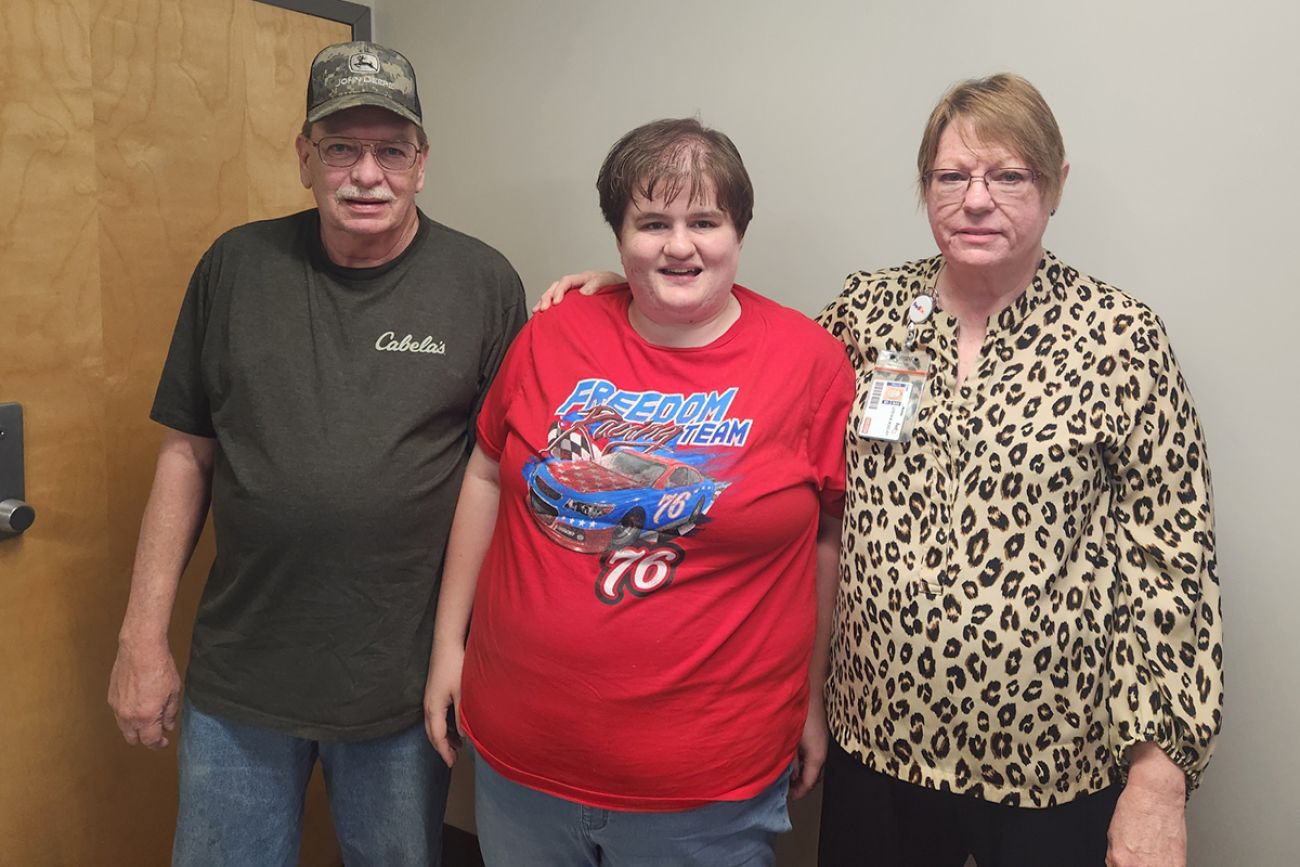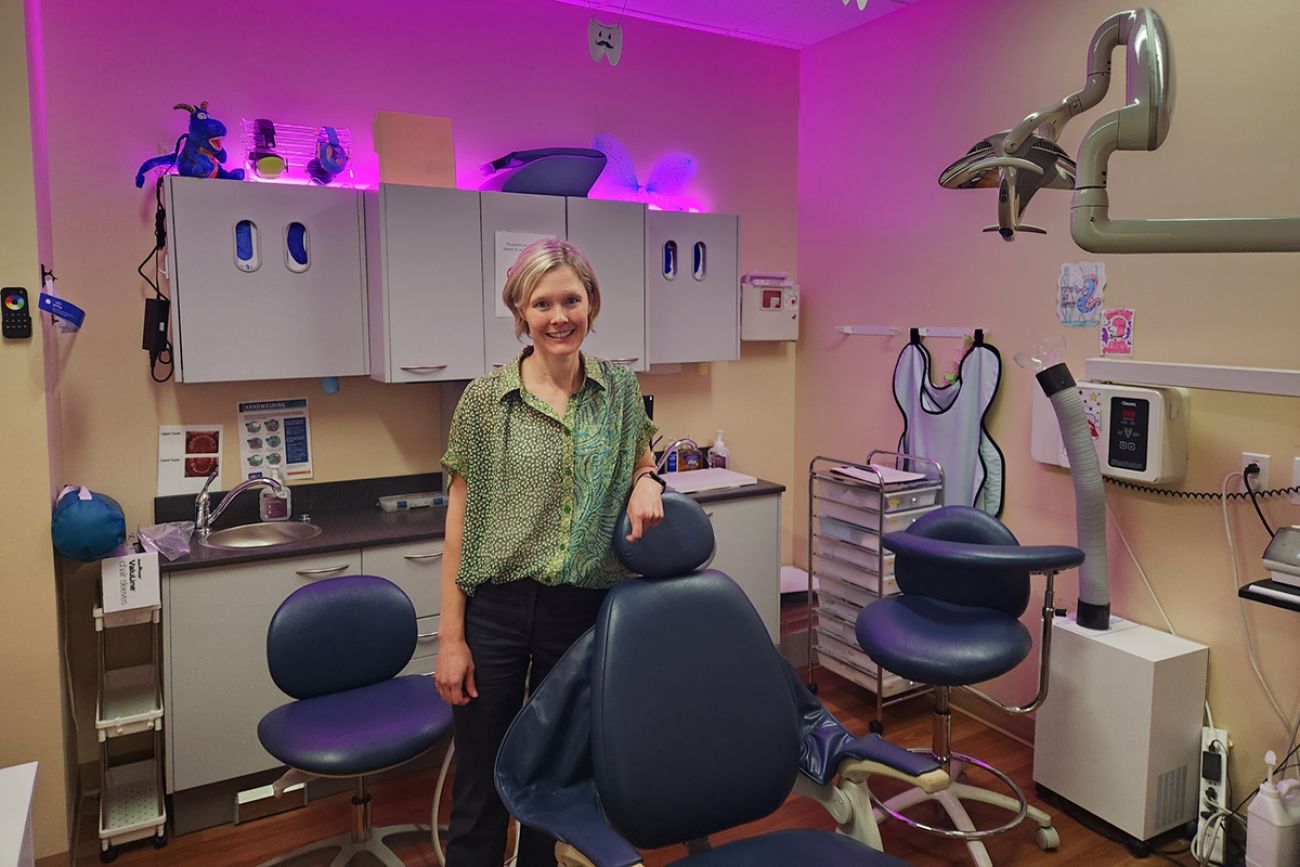Michigan dentists are learning to help, treat the developmentally disabled

- People with developmental disabilities struggle to find accessible dental care
- There is a small but growing number of dentists offering inclusive dental care
- Some have sensory rooms and sound-proofing to help calm patients
JACKSON — Inside a dentist office in Jackson, the hallways are decorated with pictures of people with disabilities and the dental care rooms feature soothing lights and noise machines.
Nearby, in a sensory room at the Center for Family Health Dental Clinic, there is a fluffy green carpet and dark blue curtains bedazzled with blinking lights. It has a collection of sunglasses for people to try on, along with fidget toys, ear plugs and headphones. The walls are soundproofed to drown out noise. The room has a couch, decorated with pillows that look like rocks, and there are stimulating lights in the corners.d.
These efforts are meant to help fill a desperate need in Michigan — dental care for those with developmental disabilities. Two out of three adults with disabilities are unable to receive oral care without modified support, something that dental professionals aren’t always trained to provide. Additional cost of providing dental facilities that accommodate these patients’ needs is daunting.
According to the Delta Dental Foundation, a nonprofit dedicated to helping expand accessibility for dental care to all communities, many of these patients also might need longer visits, which dental providers are often not compensated for by insurance providers, and some may require desensitization visits, or visits where no procedure occurs, in which dental providers don’t receive any compensation.
According to data from the Center for Disease Control, among Michigan residents with disabilities, 8.2 percent have difficulty with independent living and 4.7 percent have difficulty with self-care, including brushing their teeth. The Delta Dental Foundation reported that this population is particularly vulnerable to oral health problems, experiencing tooth decay at higher rates. This, in part, is because some people with developmental disabilities find it hard to take care of their teeth, and because of disparities in dental care.
The Delta Dental foundation provides a directory of dental providers in Michigan that offer accommodations for those with intellectual and developmental disabilities. The directory lists 127 providers, however 22 counties, have no providers listed, and only seven providers are listed for the upper peninsula counties.
The McKelvey family, who live in Jackson, struggled to find dental care for Santana until they found the Center for Family Health in Jackson. Santana McKelvey is an autistic woman in her early 20s who likes race cars and video games. Santana McKelvey lives with her mother, Tish McKelvey, who sits beside her as Santana looks for photographs of the sensory room at the dental office on her phone. She prefers to show rather than tell.

Tish McKelvey asks her daughter a number of yes-or-no questions about their first visit to the sensory room and her dentist, Dr. Kathryn Thornton. Santana McKelvey said that the room made her feel safe, and that she was free to do what she wanted in there, telling her “I like this better Mama.”
By better, she means in comparison to other dentists she has visited. Tish McKelvey told Bridge Michigan about the time and effort that it took just to get her daughter’s wisdom teeth removed when she was 16 years old. They drove two hours to an oral surgeon that would accept their daughter as a patient, and even then it was an uncomfortable experience.
“They obviously dealt with special needs people, but they didn’t have a lot of patience with that,” Tish McKelvey said. “And of course, we’re trying to sedate her, somewhat, and take her in … but then when they started doing it, then she started crying and kind of having a meltdown. And they got put off by that.”
In the past, the family has struggled with dentists who wouldn’t accept Santana as a patient as well as dentists who wouldn’t use sedation, which was often required for their daughter.
But, according to Tish McKelvey, that all changed when they met Dr. Thornton at the Center for Family Health Dental Clinic.
“I’ve hit the jackpot,” Tish McKelvey said.

The Center for Family Health’s ability to offer a sensory room and various functions to support their patients with disabilities is a result of the work of the Delta Dental Foundation. According to Thornton, she became involved in developmentally disabled dentistry through training provided by the foundation in 2022.
“Several of us (at the Center for Family Health), including dentists, assistants, hygienists, went for this three-day training and then we kind of worked from there, trying to increase our access, improve our care,” Thornton told Bridge.
The trainings help those providing dental care learn new ways to help those with disabilities, such as treating patients sitting on mats on the floor for patients who are unable to sit in chairs, or with patients wearing headphones or listening to music.
This training is growing beyond the Delta Dental foundation. The Commission on Dental Accreditation, the organization that is responsible for offering certification to dentists in the U.S., made it mandatory for all dental schools to include training on how to provide care for disabled people in their curriculum.
“I did my residency training at (the University of Michigan) hospital in a program where one of the features of their program is treating patients with intellectual and developmental disabilities,” Thornton said. “It’s one of the referral centers in the state.”
The Delta Dental Foundation also helped the Center for Family Health by funding the sensory room and connecting them with professionals who helped design and implement it. They also helped them implement similar features in their dental care rooms, so that the soundproofing and stimulating lights of the sensory room can be provided for patients during treatment.
Delta Dental Insurance, the insurance company partnered with the Delta Dental Foundation, has an insurance plan including coverage for additional costs such as additional time taken for a procedure due to a patient's needs and desensitization visits.
According to Holli Seabury, Executive Director of the Delta Dental Foundation, they crafted the insurance policy with the needs of dentists in mind.
“We really designed it with the understanding that yes, it is hard to treat a patient population that may take longer and you’re not getting compensated for that extra time,” Seabury said. “So we wanted to make sure that dental clinics, dental practices are compensated.”
While this insurance policy does help, according to Thornton, many patients she sees are on Medicaid or don’t have dental insurance that makes accommodations for the developmentally disabled. The foundation’s efforts to make dental facilities more accessible beyond their own company’s insurance program is vital for families like the McKelveys.
According to Tish McKelvey, finding a dentist who specializes in working with developmentally disabled has made a huge impact. Before Santana McKelvey started seeing Thornton as her dentist, her mother would stress about making appointments, wondering whether or not she would be able to get her daughter into the facility, let alone whether they would actually be able to complete treatment.
“But with Dr. Thornton that has not been an issue,” Tish McKelvey said.
“I’ve talked to so many parents who are just too scared to take their child to the dentist,” Seabury said. “We always want to encourage families that there is a dentist out there for you.”
See what new members are saying about why they donated to Bridge Michigan:
- “In order for this information to be accurate and unbiased it must be underwritten by its readers, not by special interests.” - Larry S.
- “Not many other media sources report on the topics Bridge does.” - Susan B.
- “Your journalism is outstanding and rare these days.” - Mark S.
If you want to ensure the future of nonpartisan, nonprofit Michigan journalism, please become a member today. You, too, will be asked why you donated and maybe we'll feature your quote next time!





